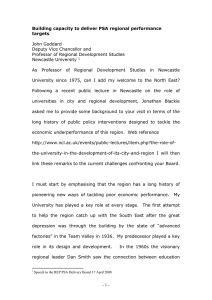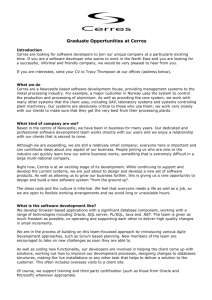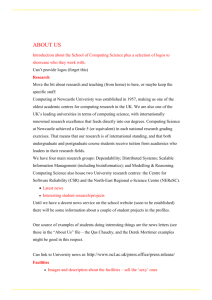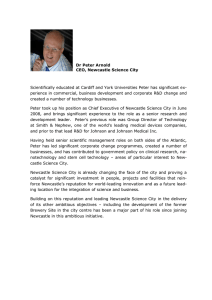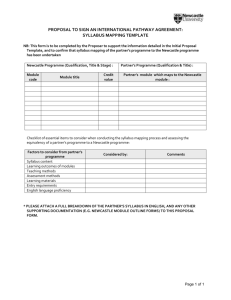Science City
advertisement
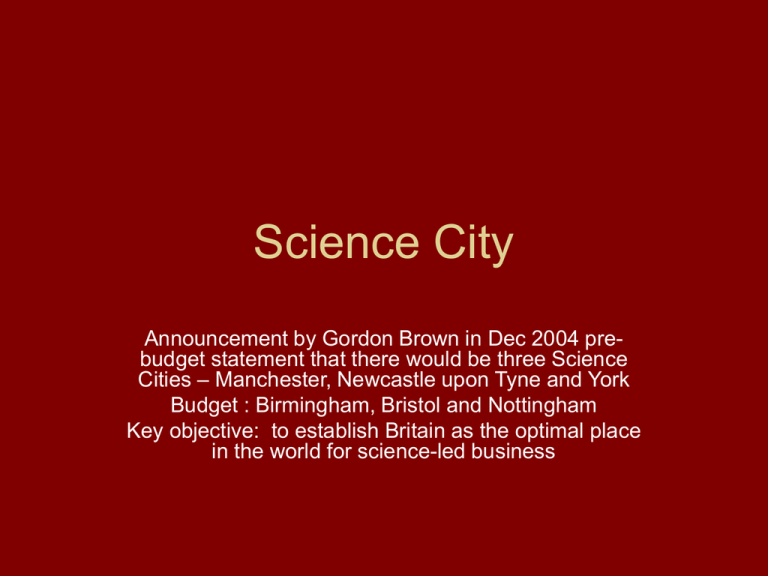
Science City Announcement by Gordon Brown in Dec 2004 prebudget statement that there would be three Science Cities – Manchester, Newcastle upon Tyne and York Budget : Birmingham, Bristol and Nottingham Key objective: to establish Britain as the optimal place in the world for science-led business Science City • Lambert review December 2003 • Evidence from worldwide studies of the importance of the physical nature of a place to its success in undertaking science and technology • Focus on how science and technology policy and expenditure could be integrated with physical regeneration policy and expenditure Newcastle Science City • Strategy for Success One North East • Newcastle University’s plans for its campus development • City Council’s plans for the development of the Discovery Quarter in the west central area Timetable • Dec 2004 three RDA’s asked to develop plans to take forward the Science City in their region • February 2005 initial document submitted to the Chancellor • June 2005 deadline for submission of detailed plans for consideration in 2006 spending review Structure • Leadership group chaired by Paul Walker • Task Group chaired by Pat Ritchie executive management and co-ordination (senior representatives of partner organisations) • Workstream Groups detailed development of each of the main areas of activity Objectives of Newcastle Science City • Development of internationally leading scientific based research, business and education, in a globally competitive environment, in the City of Newcastle • Integration of science and technological research in areas of current and future strength with related commercial and business development • Thus providing a key driver for the development of the City, the City Region, the NE of England and the UK Newcastle Science City • Hub to a wider network across the City Region and Region • Partnership of City Council, ONE, the University of Newcastle, NHS and businesses • Other stakeholders Northumbria and Durham Universities, Central Government and Science and Industry Council What are the advantages of being a Science City? • Being named a science city helps to attract investment in science and technology to the area. • It allows universities and regional businesses to bid for extra funds for research. Key Areas • Stem Cell Biology and Regenerative Medicine (collaboration of Newcastle University with ICfL, Durham, Harvard and Monash Universities) • Ageing and Health especially assistive technologies • Molecular Engineering (Chemical Engineering, Chemistry, Physics, Engineering and Nanotechnology (DTI UIC)) • Energy and the Environment Technology Village Biology Civil Engineering and Geosciences Agriculture, Food and Rural Development Natural Sciences Mechanical and Systems Engineering Chemical Eng. and Advanced Materials We map squarely onto *all* the Centres of Excellence and the Clusters Science and Industry Council Research base Mathematics and Statistics Marine Science and Technology Electrical Electronic and Comp. Eng. Computing Science Centres of Excellence Digital Technology and Media New and Renewable Energy Process Industries NorthSTAR Nanotech, Photonics& Life Sciences MicroSystems Northern Business School Clusters Stephenson Centre, RCID, EDC, ISRU, Design Unit What will it cost? • • • • • • Stem cells £34m Ageing and health £25m Molecular Engineering £25m Energy and Environment £10.5m Technology Village £43m IHG relocation £15m • Total £152.5m Where will the money come from? • • • • Specific Government grants ONE (dedicated secretariat) SRIF and its successor Private sector Workstreams • Scientific research base (Malcolm Young) • Commercialisation and Business support (Douglas Robertson) • Physical development (Larry Heslop) • Public engagement and Education (Erica Haimes) Branding • Historical context: Joseph Swan 125th anniversary • “From the darkness of the North he brought light to London” • York City and its taxi drivers • NGI • Stem cell publicity • Launch of regional marketing strategy (£7m over 3 years : Passionate people, passionate places) Richard Sykes Financial Times March 11th 2004 • “There is a big problem in this country….that all the excellence is concentrated in the South of England ….That’s where the GDP is generated…..You can’t just send it to the North-East of England. People won’t go” Sir Richard Sykes th FT March 11 2004 “You can't start funding things on geography, you've got to fund things on the basis of excellence and quality." THE INSTITUTE FOR AGEING AND HEALTH Interdisciplinary research to promote the health and well-being of older people The North of England Science Initiative A major collaboration between the Universities of Durham, Lancaster, Leeds, Liverpool, Manchester, Newcastle, Sheffield and York ‘Part of the Northern Way: Improving the economic performance of the North of England’ The Northern Way Growth Strategy • Discussed summer 2004; launched in October 2004 • Championed/led by John Prescott and Gordon Brown • Primarily focused on improving the economy of the North of England by c.£29Billion/annum by 2025 • It will achieve this by addressing issues of: – Bringing more people into work - meeting the skills needs; – Housing and building sustainable communities; – Strengthening the knowledge economy to support innovation – building an entrepreneurial culture; – Improving transport and access to ports and airports; – Marketing the North to capture a larger share of global trade; The North of England Eight ‘Research’ Universities The Universities of Durham, Lancaster, Leeds, Liverpool, Manchester, Newcastle, Sheffield, York • Total annual turnover is around £1.75 Billion • Total Research income is over £620M • ~8,000 academic staff; ~160,000 students By comparison, the Universities of Oxford, Cambridge, Imperial, UCL, London School of Economics • Total annual turnover is around £1.75 Billion • Total Research income is around £820m • ~7,200 academic staff; ~85,000 students Research Themes 1. 2. 3. 4. 5. Ageing and obesity – the quality of life of our population – Profs. Tom Kirkwood & Anne Dickinson Water and water quality, water governance, flooding and erosion – Profs Enda O’Conell and Jim Hall The Molecular Engineering Industrial Toolkit (chemistry, 21st Century chemical engineering, catalysis, biomanufacture, nanotechnology, photonics,) – Profs Nick Wright, Elaine Martin & Trevor Page The Energy ‘Thinktank’ - sustainability issues and the Nuclear Question – Profs Alan Jack & Paul Chistensen Tissue Regeneration, Stem Cells & Tissue Engineering - regenerative medicine – Prof Michael Whitaker [these involve our leading researchers and at least FOUR of our Research Institutes] Timetable • The timetable has been unbelievably tight, the original expression of interest for ODPM was submitted in <3 weeks, with the final FIVE MAJOR PROPOSALS being written in 7 weeks (including Easter) • TODAY is the deadline for the bids to be submitted • Following the election purdah, they are being sent to the three RDAs, the three SICs, the DTI & the Treasury. • Funding decisions are expected within the next few weeks. • Irrespective of success now, further proposals, based on these bids, will go directly to the Research Councils and the forthcoming EU FP7 programme – their possible match to the strategic ‘forward looks’ of these bodies has already been tested.
